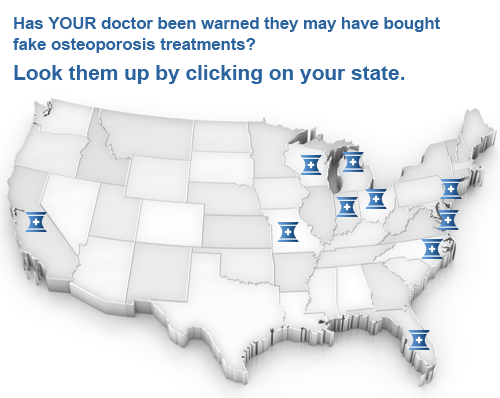How Safe Are Your Osteoporosis Drugs? Where Did Your Doctor Buy Them?
The US Food and Drug Administration (FDA) has issued warning letters to 20 US doctors that they have possibly purchased unapproved medications, including unapproved versions of the osteoporosis treatments Prolia and Aclasta, from drug wholesalers owned by suppliers operated by foreign entities outside US jurisdiction. The medical practices were warned that the wholesalers are selling drugs that not approved for sale in the United States and that they may be counterfeit.
The current warning about unapproved versions of the osteoporosis treatments Prolia and Aclasta were issued on September 10, 2012. The FDA letter states “The U.S. Food and Drug Administration has received information indicating that your medical practice purchased multiple medications from a foreign distributor owned and operated by Canada Drugs, known as Montana Healthcare Solutions, Quality Specialty Products (QSP), A+ Health Supplies, QP Medical, Bridgewater Medical, Infusion Options, UK Pharmacy Services, or Clinical Care. Most, if not all, of the products sold and distributed by one of these distributors, including versions of Prolia and Aclasta, have not been approved by the FDA.”

The US Food and Drug Administration (FDA) has issued warning letters to 20 US doctors that they have possibly purchased unapproved medications, including unapproved versions of the osteoporosis treatments Prolia and Aclasta, from drug wholesalers owned by suppliers operated by foreign entities outside US jurisdiction. The medical practices were warned that the wholesalers are selling drugs that not approved for sale in the United States and that they may be counterfeit.
The current warning about unapproved versions of the osteoporosis treatments Prolia and Aclasta were issued on September 10, 2012. The FDA letter states “The U.S. Food and Drug Administration has received information indicating that your medical practice purchased multiple medications from a foreign distributor owned and operated by Canada Drugs, known as Montana Healthcare Solutions, Quality Specialty Products (QSP), A+ Health Supplies, QP Medical, Bridgewater Medical, Infusion Options, UK Pharmacy Services, or Clinical Care. Most, if not all, of the products sold and distributed by one of these distributors, including versions of Prolia and Aclasta, have not been approved by the FDA.”
The letter, from Thomas Christl, Acting Director of Drug Security, Integrity and Recalls goes further saying, “The Agency is very concerned that products distributed by this distributor may cause harm to patients, because they may be unsafe or ineffective. Drug products obtained from Montana Healthcare Solutions, Quality Specialty Products (QSP), A+ Health Supplies, QP Medical, Bridgewater Medical, Infusion Options, UK Pharmacy Services, Clinical Care, or other foreign or unlicensed suppliers may be from unknown sources, may have unknown ingredients, may be counterfeit, or may not have been manufactured, transported or stored under proper conditions as required by U.S. law, regulations, and standards. Such products put patients at risk of exposure to ineffective or dangerous drugs. In virtually all cases, purchasing unapproved prescription drugs from foreign sources violates the Federal Food, Drug, and Cosmetic Act and is illegal.”
This is the third set of warning letters concerning misbranded and unapproved drug importation warnings purchased from Canada Drugs affiliates. In this latest set, 20 doctors in 10 states were sent FDA warnings for making purchases from an unapproved foreign supplier of medication.
In April 2012, the FDA warned doctors in 19 states that they may have purchased counterfeit versions of the cancer drug Avastin from an unapproved foreign supplier. Additional warnings were issued throughout the year. In December, the FDA warned doctors in 38 states about purchases of unapproved Botox from illegal foreign sources.
On September 21st, 2012, the FDA sent a warning letter to Canada Drugs stating the FDA had “determined that your websites offer products for sale in violation of the Federal Food, Drug, and Cosmetic Act (FD&C Act).” According to the Wall Street Journal, the FDA also made efforts to suspend the more than 3,700 pharmacy websites that Canada Drugs operates, as part of last year’s Operation Pangea enforcement operation to shut down fake Internet pharmacies.